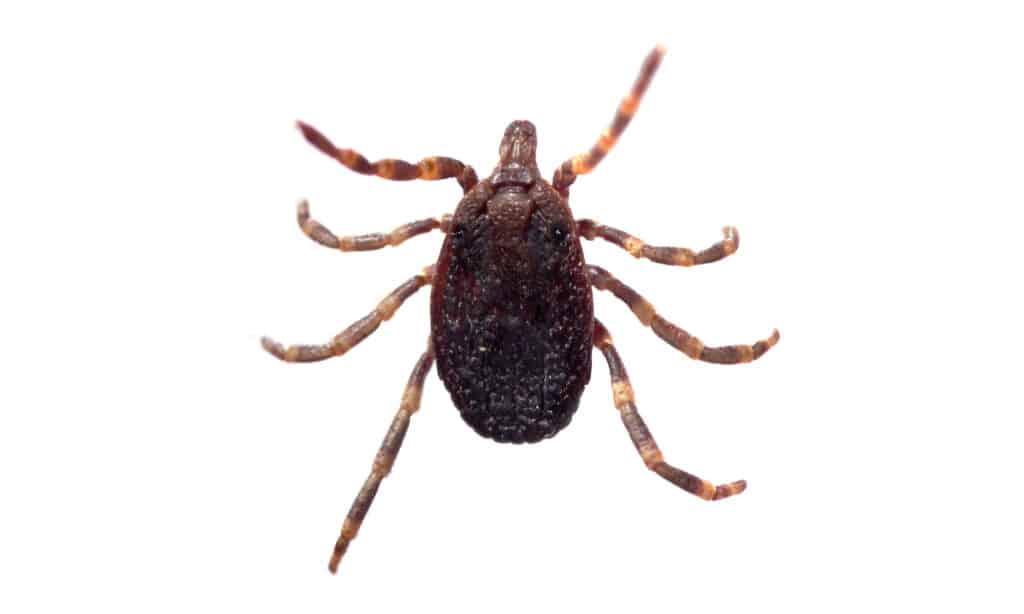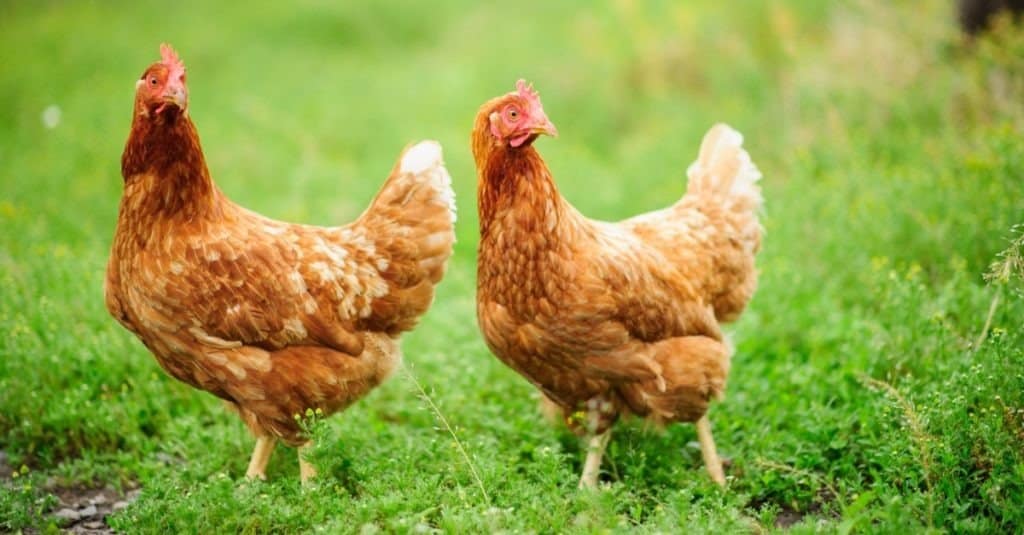There are a lot of problems that can be caused by ticks. Farmland is particularly susceptible to tick infestations. It is even possible for ticks to make a home in your backyard garden. Furthermore, backyard chicken keeping has become increasingly popular over the years. So it’s understandable that you might be wondering, “Do chickens eat ticks?” The question of whether chickens can substitute for other forms of pest control is being asked by many potential chicken owners. Chickens are known to eat bugs, so does that mean that ticks are also eaten by chickens?
Keep reading to learn more about chickens and whether they eat ticks. This article will give you an insight into the chicken diet, as well as other fascinating facts.
Do Chickens Eat Ticks?

Chickens will eat ticks and other backyard pests.
©Drakuliren/Shutterstock.com
Chickens eat ticks. In nature, birds eat bugs. The assumption that chickens eat ticks isn’t entirely ridiculous, because chickens are birds, and ticks are bugs. However, despite their tendency to consume ticks, chickens don’t always enjoy them as a snack. However, if you’ve heard that chickens eat ticks and are considering getting them for your backyard, you may want to think twice. Unlike other species of poultry, chickens eat fewer ticks than turkeys and particularly guinea fowl.
The chicken will only eat ticks when there are no other food sources available. In contrast, guinea hens actively hunt down ticks and other insects in an effort to keep them at bay. You will need to confine chickens or other poultry to a specific area if you plan on using them to kill ticks. You wouldn’t expect a flock of five or six chickens to manage thousands of ticks on a large property with thousands of ticks! Your chickens can also become tick hosts if you don’t keep an eye on them. In spite of the fact that ticks are not typically attracted to non-mammal species, they can still hook themselves onto your chickens before going onto your body.
It is recommended that you check your chickens for ticks, just as you would any other beloved pet. Without your help, ticks will attach and stay attached. In order to keep your chickens healthy, you must do everything you can.
What Exactly Are Ticks?

Ticks are blood-sucking arachnids closely related to spiders.
©iStock.com/digitalg
Typically as small as a pinhead, ticks are blood-sucking pests. These eight-legged arachnids reproduce and survive by feeding on warm-blooded creatures. People and pets are commonly bitten by them, and they often transmit diseases as well. In the United States, there are different types of ticks. It’s important to note that not all ticks carry disease. However, stay vigilant because the illnesses that they do carry can cause some serious harm to your body.
The lone star tick, the brown tick, deer ticks, and dog ticks are also common ticks found in the U.S. Disease transmission caused by ticks, fleas, and mosquitoes have more than tripled in recent decades. This is why it’s so important to stay vigilant around ticks. According to estimates, about 300,000 people in the United States get Lyme disease each year. It is expected that Lyme disease risk will continue to rise as humans encroach on natural habitats and global warming extends the tick season.
What Do Chickens Typically Eat?
The chicken is classified as an omnivore. Omnivores such as chickens eat almost anything. As a result, they naturally consume seeds, plants, insects, earthworms, snails, and small animals. It is common for chickens to eat just about anything that will fit in their beaks. Since chickens forage for their food in the wild, their diet depends on what’s available locally and seasonally. Domestic chickens, on the other hand, do not have to worry about this problem, as they can feed off chicken feed and food they find in their backyards.
It is generally known that chickens are primarily foragers, which means that they are mostly busy grazing on plants, seeds, and grasses. The beaks of chickens are used for pecking or beating food against the ground while foraging. Their food is broken up into smaller pieces using this method. It should be noted, however, that chickens are predators as well, and they frequently hunt smaller animals for food. Many people don’t know that insects, bugs, worms, and reptiles are commonly eaten by chickens. Their agility allows them to catch even swiftly moving prey. When they catch their prey, they may pick it apart or break it apart before swallowing it.
Do Chickens Help Keep Tick Populations at Bay?

A study concluded that chickens can eat around 80 ticks in an hour.
©Art_man/Shutterstock.com
Foraging for their food is one of the best ways for chickens to spend their days. When hunting for food they will eat different types of insects, wasps, worms, and ticks. Free-ranging chickens will likely reduce mosquitoes, fleas, and ticks in your yard if you let them run free.
What is the average number of ticks that chickens eat in a day? How effective are they at controlling tick populations? A study was conducted in 1991 to determine how many ticks chickens eat. For 30 minutes to an hour, chickens were allowed to roam freely in a tick-infested field. Between 300 and 331 ticks were consumed by the chickens during that time or about 80 ticks per bird. They could eat a staggering number of ticks! The chickens were able to eat quite a few ticks, but it doesn’t mean your pen or backyard chickens could eat all of the ones in your home.
If you suspect ticks might be a problem in a particular area, like a wooded or grassy area of your yard, keep your chickens in that area!
Are Chickens Immune to Tick Bites?
There is no question that ticks are blood-sucking, disease-carrying critters. In light of this information, you may be wondering whether ticks could cause illness in your chickens. However, there is good news. The consumption of ticks does not cause chickens to contract Lyme disease. For a tick to transmit Lyme disease to a new host, it must remain attached to the skin for 36 to 48 hours.
Ticks eaten by chickens cannot attach themselves to their crops or gizzards, and a chicken consumes a tick long before it digests it. Despite not being fully digested, Borrelia burgdorferi bacteria are no longer able to cause Lyme disease due to the acidity of the chicken’s stomach.
There is, however, some bad news to share. It is possible for chickens to contract Lyme disease if they are bitten and eaten by ticks.
Is There a Best Breed of Chicken for Eating Ticks?
In terms of eating ticks, guinea hens are the best chickens. You might argue that a guinea isn’t actually a chicken. You would be correct. Guineafowls, however, eat even more ticks than chickens. Choosing chicken breeds that are best adapted to foraging will help you control pests and ticks if you don’t want guineas in your yard. Ticks and insects are eaten by all chickens, but some breeds are better at finding and eating them than others.
Leghorn chickens are the most effective at eating critters among backyard chicken varieties. Whenever the opportunity arises, they feed on both pest insects and ticks. Ticks, however, are eaten by all chickens. When chickens are on patrol, you are very unlikely to be bitten by a tick anywhere they are. Make sure your chickens have plenty of free access to foraging, use bug spray whenever possible, and keep the grass short.
The photo featured at the top of this post is © Racheal Carpenter/Shutterstock.com
Thank you for reading! Have some feedback for us? Contact the AZ Animals editorial team.






